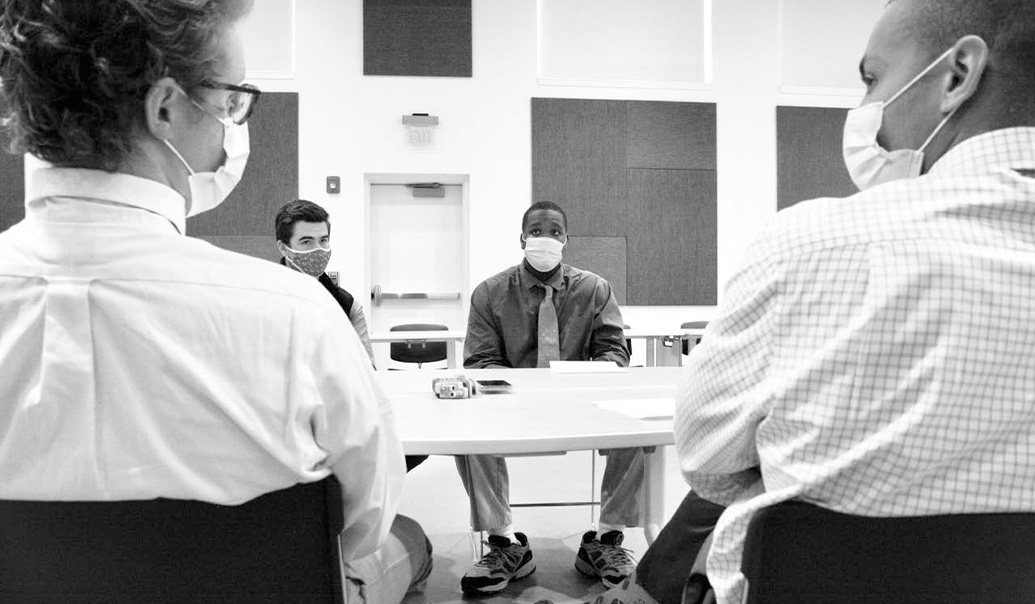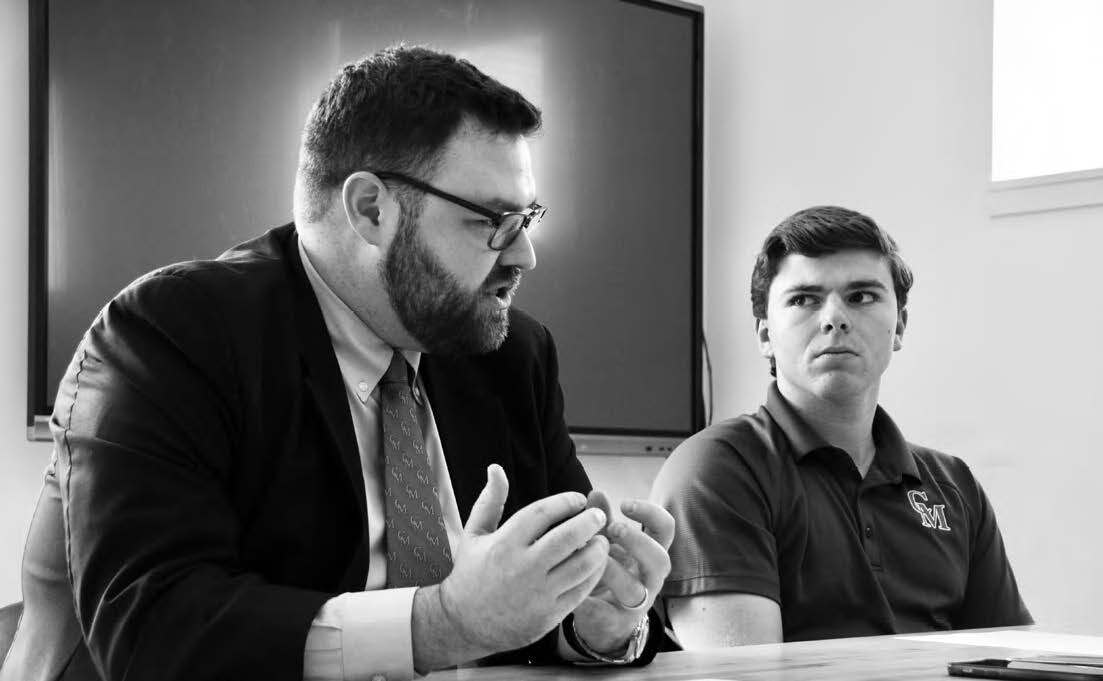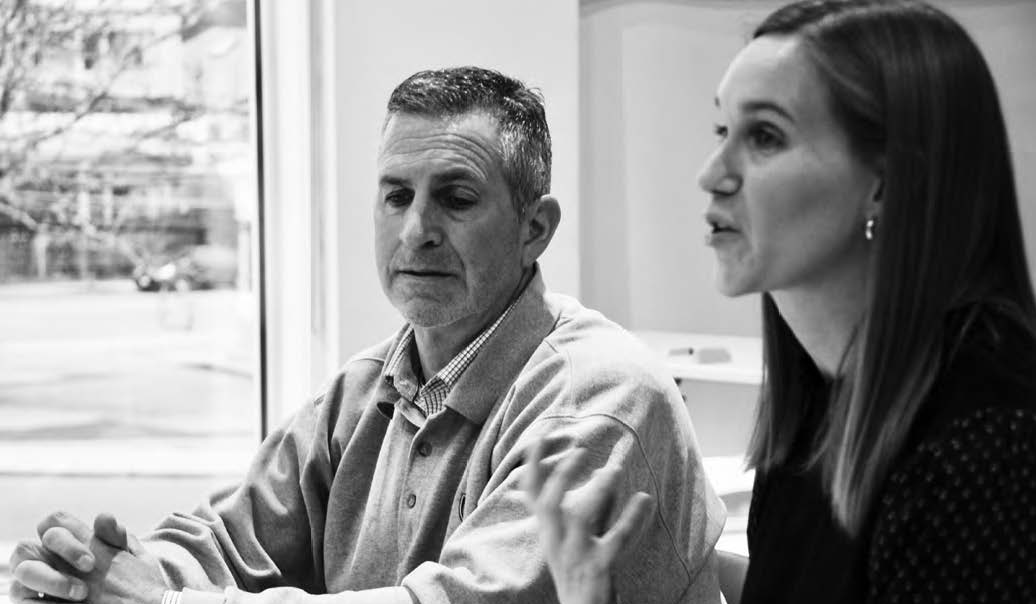Q.E.D. - Nice to meet you, Mr. Lewis

Every leader has a focus, what would you say is yours?
Adam Lewis: My focus is on two clear components: Catholic and all-boys. I’ve spent the last 26 years working in all-boys Catholic schools, it’s what I know and love. Those components, together, are extraordinarily powerful. The world has become a place where it’s hard to find meaning, and boys today crave meaning just as they did 30 years ago, but there are only a few places where that can be taught and found. There is so much noise, it is unrelenting. Every failure a person makes is publicized; the world has become so unforgiving. The tendency now is to live at a superficial level, to put on a mask for the world to see without actually living and loving authentically. Therefore, I don’t believe a Catholic, all-boys education has ever been more important. In a place like CM, there’s something more; it’s not just education, it’s a formation.
In your speech at Accepted Students’ Night back in March, you spoke of forming boys through their heads, their hands, and their hearts. What do you mean by that?
AL: What I mean is that the heart is non-negotiable. It is the central part. You can get the head and the hands, an academic and co-curricular education, anywhere… but moving one’s heart is much harder. That’s why it is critical that our school’s mission underpins our education. When I talk about the heart, I am ultimately talking about love. I mean that sincerely. What I know from years working with boys is if they come into a place feeling connected, feeling loved, and feeling as though it’s a place where they can express love, other things look after themselves. In every school I’ve worked, those boys who strive academically and attend the most selective colleges are the boys who are immersed in deep relationships with teachers, coaches, and their mates. They are the boys who perform on a stage as well as kick a ball on the field. It isn’t about how well they do it, it’s about having an openness to having their heart moved. It is the strongest positive correlation I have found.
Our culture has adopted a narrative that boys are born to misbehave. Is Catholic, all-boys education an antidote to that type of thinking?
AL: It’s the antidote. I don’t subscribe to terms like toxic masculinity or the adage that boys will be boys. That’s convenient language we’ve used to describe the worst of boys’ behavior without actually digging into it. When I grew up, I was told, “be a good man.” Yet no one really engaged me in a conversation about what it meant to be a good man. Nowadays at places like CM, we talk to our boys about what it means to be a good man, and these concepts of masculinity and manhood are being cracked open. Our boys want to engage in those conversations, but it isn’t straight-forward. It requires vulnerability. It requires us acknowledging and celebrating the sensitivity of our boys; they’re really beautiful, actually, but our culture doesn’t ascribe that to them. It’s the work I’m drawn to and it’s the work I’ll be asking of our teachers here. Yes, our faculty should teach chemistry and exponential logarithms, but I will say to our teachers, “make them better men. Remember, every moment you have with them is a chance to model what that looks like.”
As you survey what you now have… this 68-year-old institution, what do you see?
AL: To capture it succinctly, the culture of excellence is palpable here. I don’t mean elitism; I’m talking about an authentic excellence demonstrated through academic rigor, through the breadth of opportunities and the ways the boys are engaged in a cross-section of what the school offers. The example of the boy who performs on a stage and plays on a field, that kind of boy isn’t the minority here — and both activities are celebrated equally because they’re celebrations of our students’ treasures, whatever they may be.
We win at sports, we win at co-curriculars, we “win” at service. What does that competitive spirit tell you about the school’s identity?
AL: The competition is great. It means, again, there’s a pursuit for excellence. I’m competitive by nature, but I have had to wrestle with what competition looks like in schools. At its worst, competition can be destructive, both within a school and against other schools. But when harnessed correctly, competition can be powerful for boys. I am by no means a Latin scholar, but the root of the word is competere, which means, “to seek together.” I really love that outlook on competition. When our boys compete together, it can bring their treasures to the surface in powerful ways. Whatever our boys do, they have to become better men through the experience. There’s not a thing that we do here where that can’t happen.
Our winning reputation has created a perception that we are a sports school. Do you believe that perception is accurate?
AL: The perception is so different from reality. It’s funny, for a place that is so successful, they’re not raving about it in the corridors. There is a beautiful humility in our boys. I don’t walk around here and see “footballers” or “hockey players.” I don’t see that because the boys don’t talk about it, they’re not defined by that.
You’re coming from a student population of 1,400 boys to our 600, how does that change strike you?
AL: With a smaller number of boys, I’ll know them all very well. There is a rich community that CM calls “brotherhood,” which is a term that challenges our boys because you can’t pick your brothers. There is an unconditionality to the love that must exist in this place.
What will your daily movements be to continue the connections you make with students?
AL: One of the key parts of my role is to be authentically present. If we want our boys to be authentically present as men, then they need to witness that from all of us in the building, particularly from their president. How many times will a student ask me, “Hey Mr. Lewis, have you got a minute?” — and I very rarely have a minute, but I will always give them that minute because if they become men who spend their life giving that metaphorical minute, then we’ve done our job. Our boys being authentically present in that metaphorical minute is representative of the types of husbands they become, the types of fathers they become. It goes back to the smaller number of boys, which really drew me to CM…I’m looking forward to celebrating each boy individually, to being out of the office and getting to know the faculty, families, and alumni in our community.
What do you see as the future of this school?
AL: The question I’m faced with is how to convince people that our formation is still important and relevant. That can only happen from the inside out. It’s the stories of the boys’ experiences that draw others into the space and that can only come about by creating the best possible experience for them. Their happiness is our reputation. If our boys walk out of here happy, connected, and they know what it means to be a good man and are prepared to live that way, that’s the most significant barometer for success in our school.


